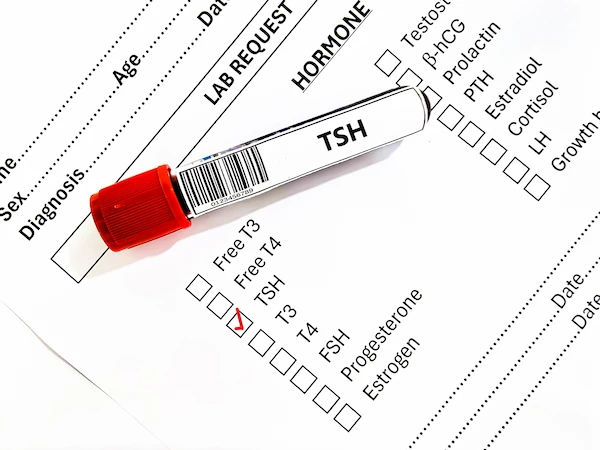Understanding Thyroid Test Results: A Patient’s Guide
Understand your thyroid test results—TSH, T3, T4 explained clearly. Learn symptoms, when to retest, and how to book a Thyroid Profile Test with Apollo 24|7.

Written by Dr. J T Hema Pratima
Reviewed by Dr. Rohinipriyanka Pondugula MBBS
Last updated on 9th Sep, 2025

The thyroid gland, a small, butterfly-shaped organ located at the base of your neck, plays a surprisingly large role in your overall health. It produces hormones that regulate nearly every process in your body, from your metabolism and energy levels to your heart rate and mood. When your thyroid isn't functioning optimally, it can lead to a wide range of symptoms that often go unnoticed or are mistaken for other conditions.
If you've recently had a thyroid test, or if your doctor has suggested one, understanding what the results mean can feel overwhelming. This guide is designed to help you, especially women and the elderly who are more commonly affected by thyroid imbalances, simplify your thyroid test numbers. We'll explain what your TSH, T3, and T4 levels truly indicate, how they relate to symptoms, and provide practical advice on discussing your results with your doctor and managing your thyroid health.
What TSH, T3, and T4 Numbers Mean
Thyroid function is primarily assessed by measuring three key hormones in your blood: Thyroid Stimulating Hormone (TSH), Triiodothyronine (T3), and Thyroxine (T4). Understanding what each of these numbers represents is crucial for interpreting your thyroid health.
Thyroid Stimulating Hormone (TSH): The Master Regulator
- What it is: TSH is produced by your pituitary gland (a small gland in your brain), not the thyroid itself. Its main job is to tell your thyroid gland how much T3 and T4 to make. Think of it as the brain's messenger to the thyroid.
- What the numbers mean:
High TSH: Usually indicates an underactive thyroid (hypothyroidism). This means your pituitary gland is working overtime, sending lots of TSH signals because your thyroid isn't producing enough T3 and T4.
Low TSH: Often points to an overactive thyroid (hyperthyroidism). Here, your thyroid is making too much T3 and T4, so your pituitary gland reduces its TSH signals. - Normal Range: Typically, a healthy TSH level falls within a specific range (e.g., 0.4 to 4.0 mIU/L), but this can vary slightly between labs and depending on individual factors.
Triiodothyronine (T3) & Thyroxine (T4): The Active Hormones
- What they are: T3 and T4 are the actual hormones produced by your thyroid gland. T4 is the main hormone produced, and much of it is converted into T3, which is the more active form that directly affects your body's cells.
- What the numbers mean:
Low T4/T3: When TSH is high, low T4/T3 levels confirm hypothyroidism. Your thyroid isn't producing enough of these essential hormones.
High T4/T3: When TSH is low, high T4/T3 levels confirm hyperthyroidism. Your thyroid is producing an excess of these hormones. - "Free" vs. "Total" T3/T4: You might see "Free T3" or "Free T4" on your report. "Free" hormones are the active, unbound forms circulating in your blood, giving a more accurate picture of what's available to your cells. "Total" measures both bound and unbound hormones. Free levels are often preferred for diagnosis.
Understanding the interplay between TSH, T3, and T4 is key. Your doctor will look at all these numbers together to get a complete picture of your thyroid function.
Recognising Thyroid Imbalance Symptoms
Thyroid hormones regulate metabolism, energy, mood, and more. When levels are off, symptoms can vary widely. Here's a simplified guide:
Common Signs of Hypothyroidism (Underactive Thyroid)
When hormone levels are low, body functions slow down:
- Fatigue and low energy
- Weight gain or difficulty losing weight
- Feeling unusually cold
- Dry skin, brittle nails, hair thinning
- Constipation and muscle stiffness
- Depression, brain fog, slowed heart rate
- Heavy or irregular periods
Common Signs of Hyperthyroidism (Overactive Thyroid)
Excess hormones speed things up:
- Weight loss despite normal or increased appetite
- Rapid heartbeat, palpitations
- Anxiety, irritability, tremors
- Heat intolerance, sweating
- Insomnia and muscle weakness
- Frequent bowel movements
- Irregular periods or bulging eyes (in Graves’ disease)
These symptoms can overlap with other conditions, so proper testing and medical advice are key to diagnosis and treatment.
When to Repeat Tests and Why
Thyroid conditions can change over time, and treatment often requires careful monitoring. Knowing when and why to repeat tests is crucial for managing your thyroid health effectively.
- After Starting or Adjusting Medication: If you've just started thyroid medication (like levothyroxine for hypothyroidism) or had your dosage changed, your doctor will typically recommend a repeat TSH test (and sometimes T3/T4) after 6-8 weeks. This allows enough time for the medication to take full effect and for your body's hormone levels to stabilise.
- Monitoring a Known Condition: If you have a diagnosed thyroid condition (hypothyroidism, hyperthyroidism, or an autoimmune thyroid disease like Hashimoto's or Graves' disease), regular testing is essential. Your doctor will set a schedule, often every 6-12 months, to ensure your hormone levels remain in the target range and to adjust treatment as needed.
- During Pregnancy or When Planning Pregnancy: Thyroid function is critical for both mother and baby during pregnancy. Women with existing thyroid conditions or those at risk, will have their thyroid levels monitored closely throughout pregnancy and postpartum.
- If Symptoms Return or Worsen: Even if you're on medication, if your symptoms of an underactive or overactive thyroid return or worsen, it's important to contact your doctor. They will likely recommend repeat tests to check if your dosage needs adjustment or if there's another underlying issue.
- Monitoring "Subclinical" Conditions: Sometimes, TSH levels might be slightly off, but T3 and T4 are still within normal range. This is called subclinical hypo- or hyperthyroidism. Your doctor may choose to monitor these levels periodically to see if they progress to full-blown thyroid disease or if intervention is needed.
Repeat thyroid tests help your doctor adjust treatment, avoid complications, and keep your hormone levels in a healthy range.
How to Discuss Results With Your Doctor
Understanding your thyroid test results can be empowering, but discussing them effectively with your doctor is key to getting the right care. Here are some tips:
- Ask for a Copy of Your Results: Before your appointment, ask for a copy of your lab report. This allows you to review the numbers and note any questions you have.
- Understand the Ranges: Familiarise yourself with the "normal" reference ranges provided by the lab (usually listed next to your results). Note if any of your numbers fall outside these ranges.
- Prepare Your Questions: Write down any symptoms you've been experiencing, how long they've lasted, and how they affect your daily life. Also, prepare questions like:
"What do these specific numbers mean for my health?"
"Is this considered hypothyroidism, hyperthyroidism, or something else?"
"What are the next steps? Do I need medication, lifestyle changes, or further tests?"
"What are the potential side effects of any recommended treatment?"
"How often will I need to be retested?" - Discuss Your Symptoms: Even if your numbers are "within range," if you're experiencing persistent symptoms, share them clearly with your doctor. Thyroid health is complex, and sometimes symptoms can be present even with seemingly normal lab values, or they might indicate a different underlying issue.
- Clarify Treatment Plans: Make sure you understand the recommended treatment plan, including medication names, dosages, how to take them, and what to expect.
- Don't Self-Diagnose or Self-Medicate: While it's good to be informed, avoid making assumptions or starting supplements without medical advice. Thyroid conditions require precise diagnosis and management by a healthcare professional.
How to Book a Thyroid Profile Test with Home Collection on Apollo 24|7
Apollo 24|7 makes it easy to monitor your thyroid health from the comfort of home. The Thyroid Profile Test typically measures TSH, T3, and T4, which are important for detecting thyroid conditions such as hypothyroidism or hyperthyroidism.
Steps to Book Your Test:
- Visit the Apollo 24|7 Lab Tests page or open the Apollo 24|7 app
- Search for "Thyroid Profile Test" or "Apollo Thyroid Assessment"
- Select your preferred date and time for the test
- Choose the home sample collection option for added convenience
What to Expect:
- A certified phlebotomist will collect your sample at home using sterile, professional equipment
- Fasting is not usually required unless your doctor specifically advises it
- Your digital report will be available within 24 to 72 hours through the Apollo 24|7 app or website
- All tests are processed in NABL-accredited laboratories, ensuring accuracy and reliability
This service is suitable for routine screenings, managing thyroid-related conditions, or addressing symptoms, all with minimal disruption to your daily routine.
Get These Tests To Get A Yourself Checked up
Conclusion
Your thyroid gland plays a vital role in regulating energy, metabolism, and mood. Understanding your TSH, T3, and T4 levels is an important step in identifying any imbalance and taking timely action. If you're experiencing symptoms like fatigue, weight changes, or mood swings, thyroid testing can provide the clarity you need. By staying informed, getting tested regularly, and working closely with your healthcare provider, you can manage your thyroid health more effectively.
With easy access to home sample collection through Apollo 24|7, monitoring your thyroid function is both simple and reliable. Prioritise your thyroid health to keep your body and mind in balance.


.webp)
.webp)


